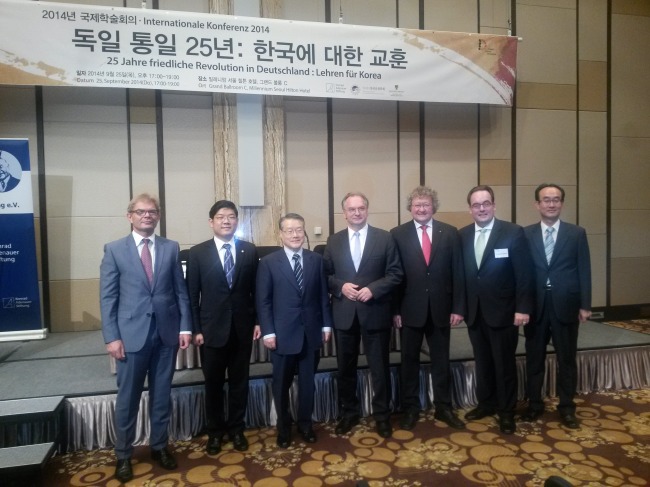Germany’s unification experience plumbed in search of lessons for Korea
By Korea HeraldPublished : Sept. 28, 2014 - 21:11
South Korean and German officials and academics convened in Seoul on Thursday to discuss what lessons might be gleaned from the unification of East and West Germany on the eve of the 25th anniversary of the fall of the Berlin Wall.
German Ambassador Rolf Mafael, professor Ra Jong-yil, a former South Korean ambassador and vice minister at the National Intelligence Service, and other senior officials discussed the significance of German unification and the many differences between the German case and the challenges South and North Korea face in reconciling after more nearly 70 years of division.
German Ambassador Rolf Mafael, professor Ra Jong-yil, a former South Korean ambassador and vice minister at the National Intelligence Service, and other senior officials discussed the significance of German unification and the many differences between the German case and the challenges South and North Korea face in reconciling after more nearly 70 years of division.

The talks took place during a panel discussion and dinner reception, entitled “25th Anniversary of Germany’s Peaceful Revolution: Lessons for Korea.”
The revolution began in the East German cities of Leipzig and Dresden in 1989, and eventually precipitated the fall of the Berlin Wall and the unification of the country the following year.
“This is a historic year. So, the Minister-President of Saxony-Anhalt (Reiner Haseloff) is visiting here. The region is very meaningful and significant in remembering German division and unification for West Germans because we had to pass through the region to enter into East Germany,” Mafael said. “I also remember waiting there for a couple of days before receiving permission to enter East Germany.”
The German Embassy and the South Korean government are commemorating the historic event this year with over a dozen events, including academic seminars, cultural exchanges, visits by VIPs and trade delegations, and a huge reception on German Unity Day, which is celebrated on Oct. 3.
By Philip Iglauer (ephilip2014@heraldcorp.com)
-
Articles by Korea Herald



![[Exclusive] Korean military set to ban iPhones over 'security' concerns](http://res.heraldm.com/phpwas/restmb_idxmake.php?idx=644&simg=/content/image/2024/04/23/20240423050599_0.jpg&u=20240423183955)




![[Pressure points] Leggings in public: Fashion statement or social faux pas?](http://res.heraldm.com/phpwas/restmb_idxmake.php?idx=644&simg=/content/image/2024/04/23/20240423050669_0.jpg&u=)
![[Herald Interview] 'Amid aging population, Korea to invite more young professionals from overseas'](http://res.heraldm.com/phpwas/restmb_idxmake.php?idx=644&simg=/content/image/2024/04/24/20240424050844_0.jpg&u=20240424200058)










